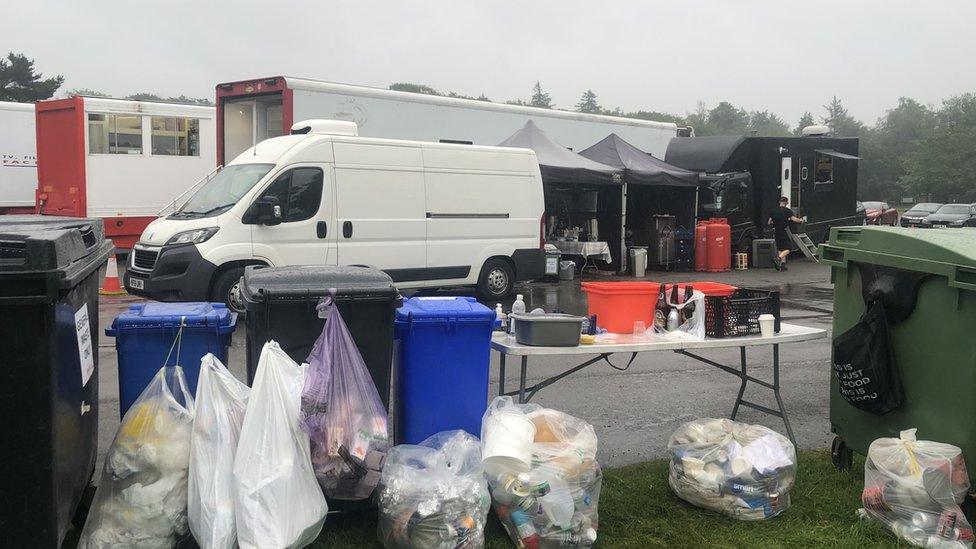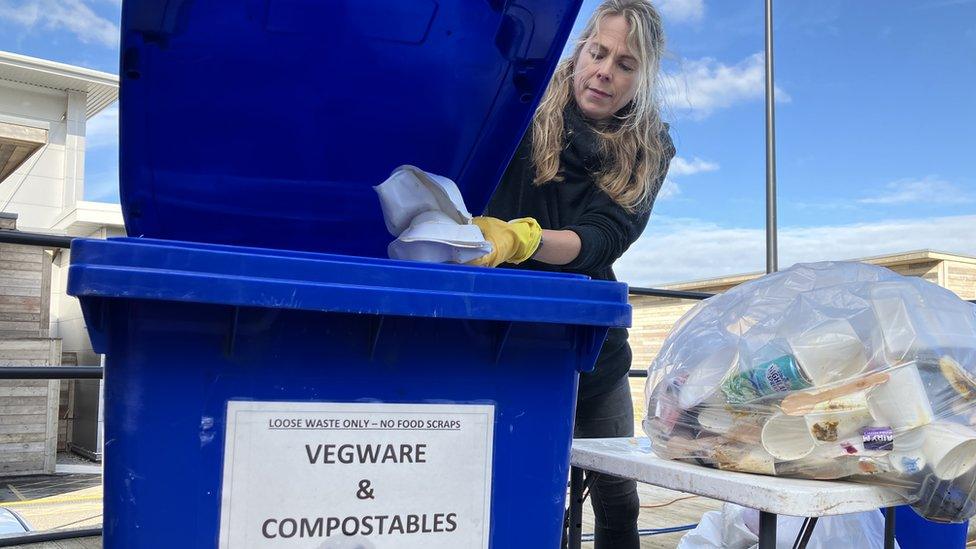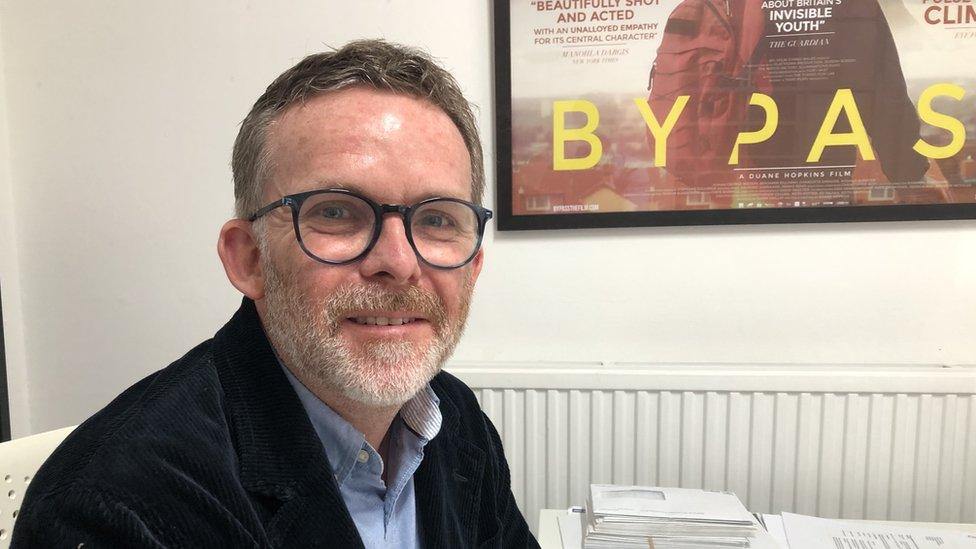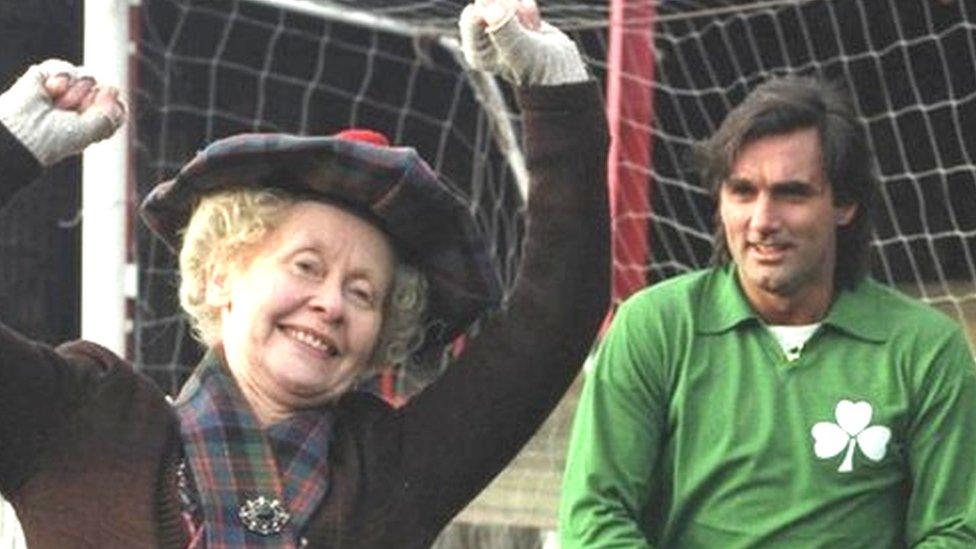Climate change: Can Wales be a leader in making net zero films?
- Published
- comments

The aim is to cut the amount of waste that gets left at the end of a typical shoot
Away from the bright lights and the big star names, Tilly Ashton spends her days on film sets doing less glitzy but no less important work.
While the cameras roll, she is busy washing dirty waste packaging and sorting it for recycling.
A veteran of big productions for Netflix and ITV, her mission is to cut carbon and reduce waste.
That's because Wales' screen sector has been chosen to pilot major changes to meet net zero targets.
According to industry experts, filmmakers both in Wales and abroad are more likely to be drawn to places where making carbon neutral films is easier.
It is something that resonated with Tilly from her first time on the set of a major production.
She noticed straight away the sense of shame among crew members regarding the amount of waste that gets left at the end of an average shoot.
It presented a clear opportunity to try to find a way of reducing waste and cutting the large carbon footprint created within that world.
"It's a massive challenge, like trying to turn a super tanker," said Tilly, a film and television sustainability coordinator.
"People who have been in the industry for a long time have ways of working under pressure and know what suits them best - they don't have time to think of other ways of doing things.
"So what I've focused on initially are the easy wins."
Most recently having worked on an upcoming Martin Clunes drama for ITV, part of Tilly's time is spent cleaning used packaging and separating it into different recycling bins.
Her work also focuses on encouraging crew members to think more about sustainable options - for example, asking the catering department to provide meals with a smaller carbon footprint.

"It's a massive challenge, like trying to turn a super tanker," says Tilly Ashton of her unglamorous but vital work
But while Dragon Studios in Bridgend, which hosted the Clunes production, runs entirely on green energy, filming in rural and remote parts of Wales can often require carbon-heavy transport and energy use - diesel-powered generators, for example.
"As a result, I suggest how we look at cleaner types of fuel," said Tilly.
"We have an option such as HVO (hydrotreated vegetable oil), which is 90% lower on carbon emissions and much cleaner burning, so better in terms of air quality but it's more expensive.
"However, persuading a production to go for HVO it can be difficult if budgets are really tight.
"What we really need are dedicated environmental budgets that I can then prioritise which will benefit our carbon footprint."
Tilly is now employed by Severn Screen in Cardiff and her first on-set experience was during the filming of its upcoming Netflix thriller Havoc, starring Tom Hardy.

"We're not going to solve the sustainability challenge overnight, we have to keep learning," says Mathew Talfan of Severn Screen
Mathew Talfan, head of strategy and operations at Severn Screen, said: "Actually having someone whose sole responsibility is sustainability has been transformational for us.
"It's meant that voice is there as we're planning production from the very early stages. We're not going to solve the sustainability challenge overnight, we have to keep learning."
Wales is the first UK nation to participate in Screen New Deal, a landmark initiative which offers support to reach zero-carbon and zero-waste targets.
Bafta albert, an environmental organisation which upholds sustainability standards within the screen industry, has said it hopes its plan for Wales will provide a blueprint for the rest of the UK.
Average CO2 emissions from TV and film produced in the UK in 2022 far exceeded the levels of the previous five years.
Bafta albert said this was reflective of industry engagement to disclose information and an improvement in data recording.
Welsh productions were more reliant on diesel in 2022 compared to the UK average, according to new figures.
The reliance on road travel on Welsh productions was almost double the UK average - although air travel accounted for 14% of emissions for transport, which was much lower than the UK average.
Other elements which have been measured to calculate the overall carbon footprint of productions include food, in particular meat consumption, what materials are used to build sets and whether they've been recycled or stored for reuse.
'Climate change is impacting our world'
Bafta albert's pilot project in Wales will focus on a number of key areas, including a shift to renewable energy on location, establishing carbon budgets for productions and creating a circular approach so that costumes and kit is reused.
Its head of industry sustainability, April Sotomayer, said: "Climate change is impacting our world in immediate and sustained ways, and the film and high-end television industries have a key role to play in showing the ways to address it.
"It is a very exciting step for the production community in Wales to pilot the Screen New Deal, and we're committed to working with stakeholders on the ground to support programme-makers in adopting these recommendations."
Wales' Deputy Minister for Arts, Sport and Tourism Dawn Bowden said the screen industry in Wales is of huge value.
"The benefits and potential of the industry are huge for us, but we must also be focused on ensuring we are all working together to minimise the impact on our environment," she said.

A SPECIAL SCHOOL: Life in Britain’s biggest special school
FANCY A LAUGH?: Join Rhod Gilbert as he tries out different jobs across Wales

- Published8 June 2023

- Published13 November 2023

- Published13 September 2023
